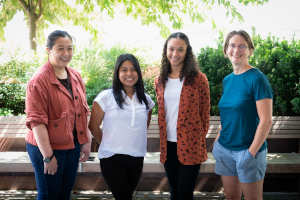ASC Internship

This is a paid internship is for students who are curious about working in a research lab. You will learn how to ask scientific questions and to work with our team to answer those questions. We will help you meet people in lots of different kinds of science-related jobs, and to build skills and experience that may help you start a career.
During the internship, you will complete lessons to prepare you to be successful in a career in science, learn and perform hands-on research in the lab, meet many different kinds of scientists and learn how they chose their career path, and develop professional skills that will translate to any workplace. Successful completion of the internship will help you build your professional skills, resume, and network to help you take whatever next educational or career steps that interest you.
You are eligible to apply to this internship if you:
- attend a high school in Oregon and either live in the Portland area, or have room and board in the Portland area for two summers that is approved by your parents or legal guardians; AND you are a high school junior;
- OR attend 4-year college/university in the State of Oregon and can secure housing in the Portland area for two summers;
- are a US citizen, permanent U.S. resident, or eligible Deferred Action for Childhood Arrivals (DACA) student with an employment authorization card via USCIS;
- AND come from a background that is underrepresented in the health and science professions (includes American Indian or Alaska Native; Black or African American; Native Hawaiian or other Pacific Islander; Hispanic or Latino;
- OR demonstrated experienced of other economic*, educational, ethnic/cultural, family hardships**.
*Economically disadvantaged students are defined as individuals who come from a low-income family, using low income levels specified by the U.S. Department of Health and Human Services as a guideline.
**If you have experienced other educational, ethnic/cultural, or family hardships, description of such hardships are required for evaluation of eligibility.
Fill out an application. Appointment to the internship dependent on NIH approval and funding.
Trouble getting started in science?
If you are a high school or college student, especially if you are from a background that is under-represented in STEM, and want to talk to a scientist about how to get connected with a research lab (even if you are not interested in biology!), you are welcome to contact Sonnet Jonker and Sam Louey for advice and help. Let us know you're interested in this help, not asking about a position in our lab.
Clone our internship program
The ASC internship program is a highly structured yet flexible program designed to integrate interns from backgrounds under-represented in science into the lab. We plan to make our internship program available as a model to other NIH-funded research labs. If you're interested in our model, please reach out.